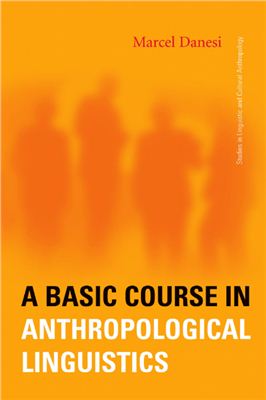Pages: 235
Publisher: Canadian Scholars Press (2004)
Quality: good: pdf
Language can be studied from several angles. The focus on the relation between language, thought and culture is known as anthropological linguistics (AL). This text constitutes a basic introduction to the subject matter and techniques of AL. Traditionally, anthropological linguists have aimed to document and study the languages of indigenous cultures, especially North American ones. Today, however, the purview of this exciting science has been extended considerably to encompass the study of language as a general cultural phenomenon, and to determine genealogical relations among languages, so as to recreate ancient cultures through them. In non-technical language, with plenty of examples related to languages across the world, this book introduces the basic notions, concepts, and techniques of AL. It also discusses the origin and evolution of language, focusing on the comparison and reconstruction of language families. Its treatment of techniques for analyzing sounds, words, sentences and meanings introduces the student to what must be understood about language and its structure in order to apply that knowledge to the study of thought and culture. The final two chapters examine how languages vary according to social factors and how languages influence cognition. To enhance the text's pedagogical utility, a set of practical activities and topics for study accompany each of its eight chapters. A glossary of technical terms is also included. The overall objective of A Basic Course in Anthropological Linguistics is to show how the technical methodology of linguistic analysis can help students gain a deeper understanding of language as a strategy for classifying the world. The text'sunderlying premise is that the distinction between language and knowledge is hardly ever clear-cut. Indeed, the two enter into a constant synergy-a synergy that defines the human condition.
ISBN 1-55130-252-7
Publisher: Canadian Scholars Press (2004)
Quality: good: pdf
Language can be studied from several angles. The focus on the relation between language, thought and culture is known as anthropological linguistics (AL). This text constitutes a basic introduction to the subject matter and techniques of AL. Traditionally, anthropological linguists have aimed to document and study the languages of indigenous cultures, especially North American ones. Today, however, the purview of this exciting science has been extended considerably to encompass the study of language as a general cultural phenomenon, and to determine genealogical relations among languages, so as to recreate ancient cultures through them. In non-technical language, with plenty of examples related to languages across the world, this book introduces the basic notions, concepts, and techniques of AL. It also discusses the origin and evolution of language, focusing on the comparison and reconstruction of language families. Its treatment of techniques for analyzing sounds, words, sentences and meanings introduces the student to what must be understood about language and its structure in order to apply that knowledge to the study of thought and culture. The final two chapters examine how languages vary according to social factors and how languages influence cognition. To enhance the text's pedagogical utility, a set of practical activities and topics for study accompany each of its eight chapters. A glossary of technical terms is also included. The overall objective of A Basic Course in Anthropological Linguistics is to show how the technical methodology of linguistic analysis can help students gain a deeper understanding of language as a strategy for classifying the world. The text'sunderlying premise is that the distinction between language and knowledge is hardly ever clear-cut. Indeed, the two enter into a constant synergy-a synergy that defines the human condition.
ISBN 1-55130-252-7

